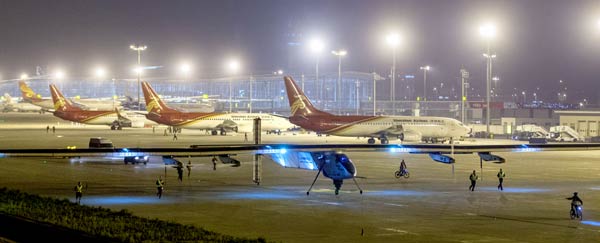Solar Impulse 2 lands in Nanjing
By CANG WEI and Wang Xin in Nanjing, Jiangsu province (chinadaily.com.cn) Updated: 2015-04-23 09:59
The Swiss pilots and maintenance team of Solar Impulse 2, the world's most advanced solar-powered airplane, will attend a series of exchange and promotional activities to advocate energy-efficient technologies after landing in Nanjing, Jiangsu province, on Tuesday night.
In its second stop in China and the sixth stop on the round-the-world adventure, the team and the two pilots, Bertrand Piccard and Andre Borschberg, will visit schools where they will meet and talk with Chinese students.
The plane took off from Chongqing metropolitan, where it stayed for about three weeks and delayed taking off several times due to weather conditions.
Piccard, who controlled the flight to Nanjing, said that compared with his work as a pilot, the work of weather specialists and engineers turned out to be more challenging.
"We simulated all possible trajectories and exhausted all different strategies to get Solar Impulse 2 in the air, from defining pit-stops at airports along the route, to trying different speeds, altitudes and holding patterns."
Piccard was busy during the 17-hour flight to Nanjing; he had food, took pictures and received satellite interviews. But he was sleepless because the thick clouds he encountered along the way required intense concentration.
"Throughout the entire process, the Chinese authorities have been unfailingly helpful and open to our ideas," said Piccard. "We are amazed by the spirit of our team and the willingness of our partners to help us achieve our goal."
Co-pilot Borschberg, who has returned to Switzerland to treat migraine symptoms and a minor skin condition, commented that the Nanjing stop will be essential for the whole trip as the plane will be preparing to cross the Pacific Ocean and equipment needs to be checked before it does so.
Borschberg will come to Nanjing later this week to prepare for the next leg to Hawaii, which is scheduled for early May.
The 8,172-kilometer journey over the Pacific Ocean to Hawaii will take the plane five consecutive days and nights.
After landing in the United States, the plane will stop in either North Africa or Southern Europe before returning to Abu Dhabi to complete its 12-leg world adventure.
The adventure is scheduled to take five months starting from March 9.
Powered by 17,248 solar cells installed on its wings, the plane can fly day and night without fuel. The single-seater aircraft, which is made from carbon fiber and weighs only as much as a car, needs two pilots to take turns to fly.
During a previous interview with China Daily, the pilots said that what they want to promote is not the use of renewable energy, but the importance of using more energy-efficient technologies.
To welcome the aircraft, the Nanjing Lukou International Airport has established a 3,200-square meter hangar and set aside an area of 30,000 square meters to the east of the runway for it to "sunbathe" in fine weather.
The hotel where the team is staying has also prepared local Nanjing specialties and various kinds of cheese, sausages and desserts for the Swiss guests.
- Govt encourages people to work 4.5 days a week
- Action to be taken as HIV cases among students rise
- Debate grows over reproductive rights
- Country's first bishop ordained in 3 years
- China builds Tibetan Buddhism academy in Chengdu
- Authorities require reporting of HIV infections at schools
- Typhoon Soudelor kills 14 in East China
- Police crack down on overseas gambling site
- Debate over death penalty for child traffickers goes on
- Beijing to tighten mail security for war anniversary








